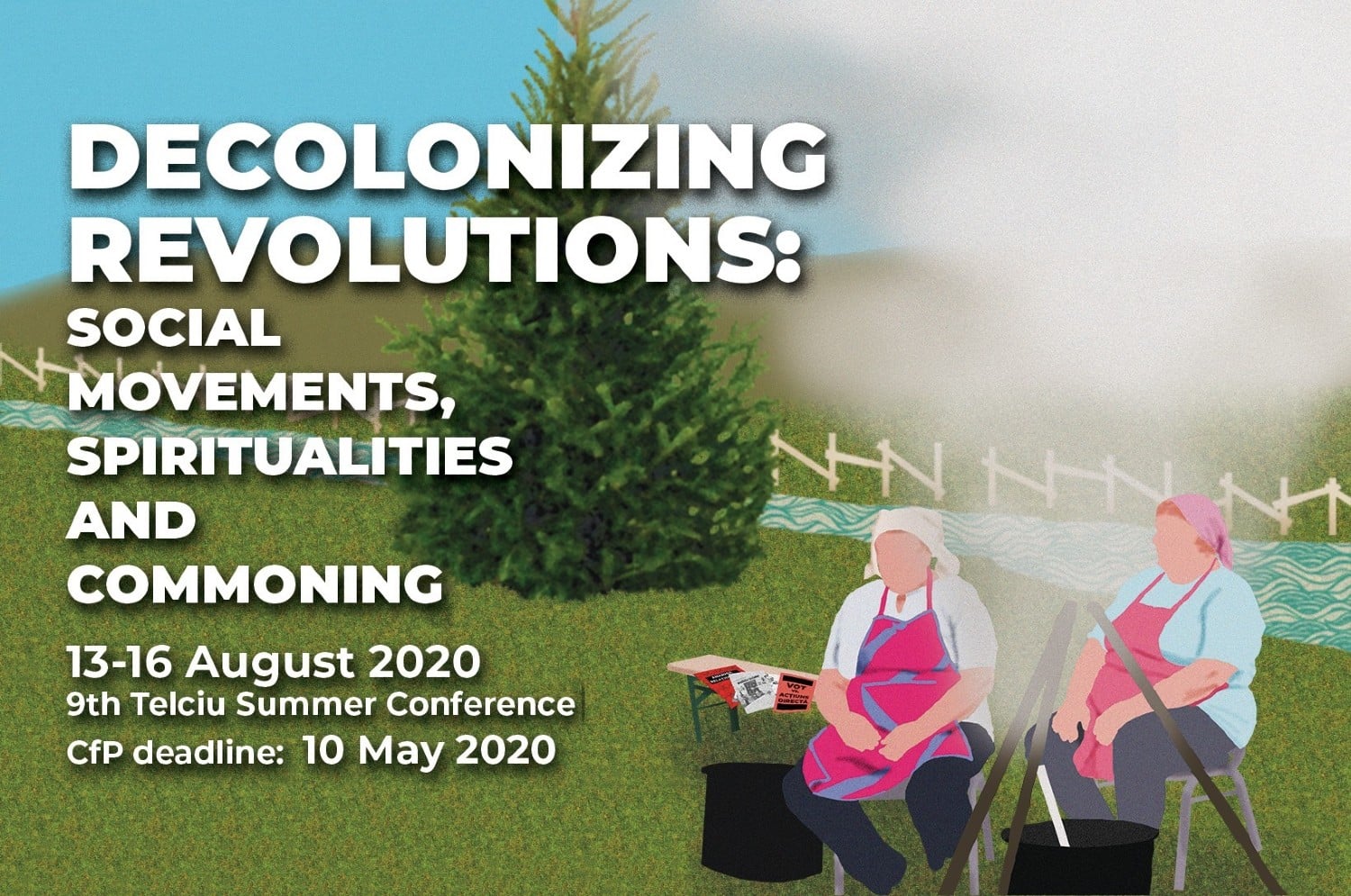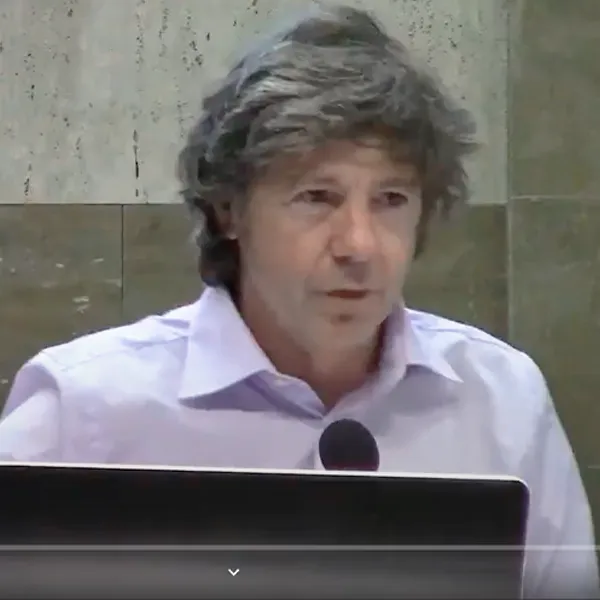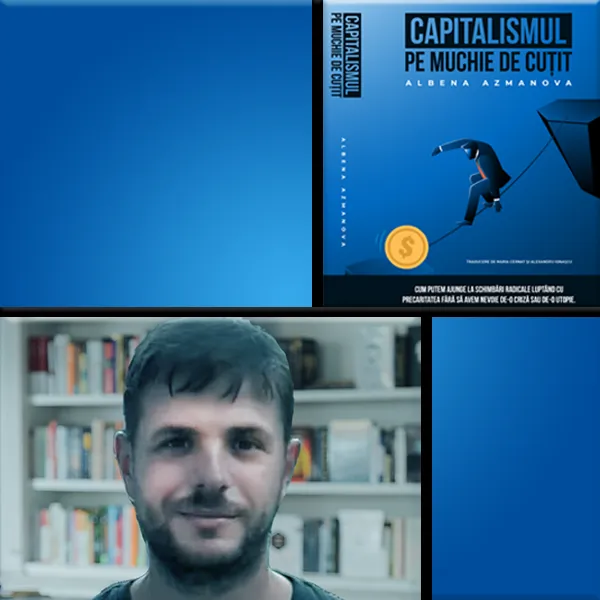9th Telciu Summer Conference: Decolonizing Revolutions: Social Movements, Spiritualities and Commoning
13-16 August 2020, Telciu, Romania
Call for Papers
The historical conditions of our present moment are set in no small part by centuries of colonial domination, through which contemporary racist and patriarchal social orders were forged. Contemporary imaginations are hobbled by the enduring Cold War legacies that insist on the fiction of bipolarity between so-called capitalist “freedom” on one hand, and “communist” totalitarianism on the other, while disregarding that this war was not a cold one in the Global South. Where empires have been replaced by territorial nation-states, old practices of persecuting and marginalizing state-designated “others” continues. (The Rohingya in Myanmar, Indigenous peoples in the Americas, nomadic pastoralists/Bedouins in places like China and Algeria). “Decolonizing” is a vision that we aspire to enact together across the three domains mentioned above. It means different things to different people: the interest is in comparing notes and swapping strategies. In Telciu, we have been developing reflections on the ways the wider region has been shaped by and resisted coloniality and modernity. Researchers coming from different backgrounds to Telciu are continuously looking for possibilities of connecting issues related to peripheralization, domination, and othering.
As partners in a decolonial project, the organisers of the Telciu Summer Conference and School are well aware that contemporary revolutionary ideals and praxis must contend with the difficulties of building social movements when no one has time; cultivating modes of togetherness, spirituality and inner life when the meanings of such terms have either been monopolized by the conservative religious right or commodified under liberal capitalism; and restoring spaces of collaborative survival and well-being in a time of planetary enclosure, privatization and expropriation when the modern state and its police force are built around the ideal of policing and protecting private property.
We, therefore, invite presentations that tackle and analyze the three practices of social movements, spiritualities, and commoning as they roughly correspond to the cultural-political, affective-embodied, and material-spatial domains of theory and practice, as our contemporary circumstances are characterized by:
- Social Movements: The strangulation of cultural and political life through processes such as time-poverty and precarity, hence the difficulty of building social movements and/or protecting them from takeover by fascist impulses.
- Spiritualities: The commodification and policing of inner life through state and corporate surveillance on one hand, and the monopolization of “the spiritual” (however defined relation of one’s inner life in relation to other humans, beings, and the cosmos) by conservative religious movements on one hand, or neo-liberal self-entrepreneurialism on the other. Both have the effect of shackling the imagination of what is possible in terms of collective and individual imagination, and both have proven vulnerable to fascist or capitalist cooptation. Therefore it is essential to discuss spiritualities in the context of revolution.
- Commoning: The foreclosure of open-ended communal/community ways of “being in good relation” (to quote Kim Tallbear) to human and non-human others as a matter of mutual survival and well-being through ongoing processes of enclosure and expropriation of all aspects of individual and collective life. A shared feature of the varieties of neoliberalism is the structural violence through which the only possible way to live is a destructive and wasteful one.
Historically, it has been challenging to place the cultural, spiritual, and material stakes on the same plane of struggle. Leftist thinkers have dismissed spirituality or conflated it with the dogmas of organized religion on the one hand, or the decadence of new-age mysticism on the other. To be sure, there is abundant evidence to substantiate these critiques. However, liberation from the violences of the status quo is not to be had without the project of reclaiming one’s inner life. The importance of considering the political, economic, affective, and material dimensions of our quests for emancipation requires that we draw these three together. Perhaps we can learn from failed examples that emphasized one at the expense of the other. Perhaps the confluence of evangelical religions and right-wing movements in the US, Latin America, Central and South Africa is evidence of the danger of leaving the spiritual outside the terrain of political and social engagement. At the same time, we would like to address the inherent tension in the supposed small-scale nature of commons, communal living and sustainable alternatives in general and the need for large scale opposition to the totality of capitalism, by discussing the scaling or inter-connecting commons and non-capitalist durable economies, the possibilities for undoing the corruption of commons and structural couplings of commons and capital and available options for cultivating lifeworlds outside capital and the state
Keynote speaker: Julie Klinger, University of Delaware
The language of the conference is English.
There are no fees for the conference participants. The organizers will cover meals for the speakers and will book, but not cover, accommodation (single: 80RON/night; double: 120 RON/night). In case you cannot cover the accommodation, please let us know, as we are able to cover it for up to 5 speakers based on need and by request. Independent researchers or junior researchers will be given priority with accommodation.
The conference presentations will take place on the 14th and 15th of August, with a welcome dinner on the 13th and activities for the start of the Summer School on the 16th.
If you would like to participate, please send us your title, a 300 word abstract and your affiliation in English by the 10th of May to [email protected]. If you are a speaker of Romanian, please send us your abstract both in English and Romanian, so as to ease the work of our translators (we like to print our materials in both languages in order to showcase our work for the non-English speaking public).
Please note that the Telciu Summer Conference is followed by the Telciu Summer School (16-23 August), in English and Romanian, with the same topic. The Summer School is designed around longer seminars and other cultural and artistic activities and has a more open structure as the Summer Conference. If you would like to participate, the Summer School has a separate registration process that will be open later in March. However, please let us know if you would like to stay for the Summer School as well. For more information, please visit http://telciusummerschool.ro/.
Organized by the Center for the Study of Modernity and the Rural World (CSMLR, Telciu, Romania) and the County Museum of History and Art, Zalău.
Funded by Telciu City Hall and Village Council, Lucian Blaga University of Sibiu through the project Colonialism, Post-colonialism and Self-colonization in Romanian Literature (AFCN – Administration of the National Cultural Fund) and University of Delaware Department of Geography and Spatial Sciences
Partners: Institut für Soziologie, Albert-Ludwigs-Universität Freiburg (Germany), Secondary Technical School of Telciu, Tact Publishing House, Transilvania Print, Observator Cultural, Baricada, CriticAtac, Gazeta de Artă Politică, Platzforma, Transindex, Liga Oamenilor de Cultură Bonțideni, Bistrițeanul, Observator BN, Timp Online, Prăvălia culturală, Mesagerul de BN
Scientific Board:
Cornel Ban, UK/Copenhagen Business School, Denmark
Manuela Boatcă, Albert-Ludwigs-Universität Freiburg, Germany
Alina Branda, Babeș-Bolyai University, Cluj, Romania
Sorin Gog, Babeș-Bolyai University, Cluj, Romania
Julie Klinger, Boston University, USA
Anca Pârvulescu, Washington University, St. Louis, US
Julia Roth, Centre for Inter-American Studies, University of Bielefeld, Germany
Ovidiu Țichindeleanu, IDEA arts+society, Cluj, Romania
Madina Tlostanova, Linköping University, Sweden
Main Organizers:
Adina Mocanu, University of Craiova, Romania / ADHUC- Centre de Recerca, Teoria, Gènere, Sexualitat, Barcelona, Spain.
Ágota Ábrán, Museum of History and Arts, Zalău, Romania
Anastasia Oprea, Center for Social Studies / Economics School, Coimbra University
Photo: The 9th Telciu Summer Conference wil take place between 13 and 16 August 2020
The Barricade is an independent platform, which is supported financially by its readers. Become one of them! If you have enjoyed reading this article, support The Barricade’s existence! We need you! See how you can help – here!










